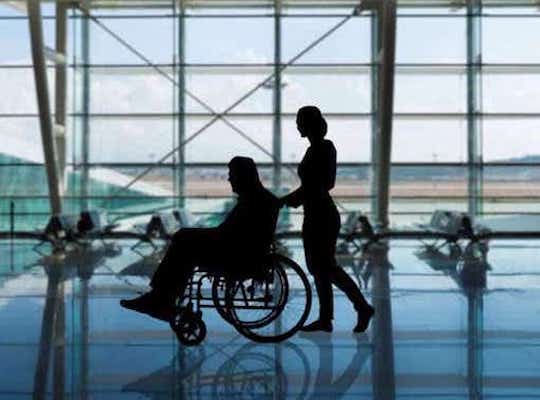Looking Back at CurePSP's Ask the Expert Series in 2024
Dec 20, 2024 Courtney Malburg
As CurePSP wraps up the year, we want to reflect on the guidance and education provided in our Ask the Expert webinar series. This year, healthcare professionals, advocates and community members partnered with us to generously share their expertise.
This year alone, 1,367 people registered to join these conversations, find comfort in knowledge and learn how to better manage the symptoms of PSP, CBD and MSA, and almost 5,700 people viewed the webinars on our YouTube channel.
We know that the past 12 months may have been a blur, so as a refresher, we've put together some of the main takeaways from each of the 2024 Ask the Expert webinars.
January: Gait and Balance Abnormalities with PSP
Farwa Ali, MD – Mayo Clinic
In PSP, the connection between the parts of the body involved in balance and the brain is affected. These issues with balance can manifest in a few different ways for someone with PSP:
Parkinsonian gait:
- Slowness
- Small, shuffling steps
- Stooped posture
- Stiffness and rigidity
Postural instability:
- Falls
- Retropulsion, or falling backwards
- Festination, or an inability to stop walking
Freezing of gait:
- Involuntarily taking tiny steps
- Trembling or shaking their legs in one spot when attempting to move
- Inability to move at all
Risk reduction and treatments for balance and gait issues:
- Correct any visual issues as much as possible.
- Consider fall prevention methods, such as walkers and installing handrails.
- Seek out physical therapy that can be personalized to specific balance and gait issues.
- Assess current medications with a neurologist to make sure there aren’t any that are making it more difficult to maintain balance.
Issues with gait and balance can always be discussed with your neurologist. Physical and occupational therapists can be a great resource to help you learn and manage these symptoms.
March: Navigating Advancing Symptoms and Stages of PSP, CBD and MSA
Jori Fleisher, MD – Rush University
While PSP, CBD and MSA are progressive diseases that worsen over time, it’s not typical to have very intense and sudden changes in symptoms. Sudden changes can look like an increase in falls, unusual choking on food or saliva, more freezing of gait or increased confusion.
These sudden changes can be caused by external and reversible factors such as:
- Constipation
- Urinary tract infection (UTI)*
- Pneumonia
- Other infectious diseases (teeth, feet, seat)
- Dehydration
- Medication errors (missed, added, etc.)
Self-advocacy can be very helpful when dealing with sudden changes. It may not be the medical team’s first instinct to test for unrelated issues, viruses, infections, and you will likely have to educate them on the nuances of the diagnosis and possible causes of symptom changes. Typically, once these external issues are solved, the sudden changes in symptoms dissipate.
* UTI symptoms tend to look differently for people with PSP, CBD or MSA. If there are ever any sudden changes in symptoms, it is suggested to ask the medical team for a test to determine if the person has a UTI.
May: Your Role in Advancing Legislation through Advocacy
Julie Balasalle, LCSW (CurePSP and I AM ALS)
Mason Zeagler, Government Relations Officer (The Michael J. Fox Foundation for Parkinson’s Research)
As someone with or affected by PSP, CBD and MSA, it can be hard to cope with knowing that we have os much left to learn about these diseases. How can advocacy on the federal level help promote hope? Because advocacy can:
- Help raise awareness of the diseases
- Increase and diversify the research and funding available
- Advance therapies and treatments
- Improve access to care
- Reduce exposures to environmental risk factors
Together, all these pieces can help lead researchers and scientists towards a cure for Parkinson’s disease, and eventually for atypical parkinsonisms like PSP, CBD and MSA.
July: Memory, Thinking and Behavior
Federico Rodriguez-Porcel, MD – Medical University of South Carolina
People with PSP, CBD and MSA all experience cognitive changes differently. As these changes occur, it can be difficult to know how to adapt to them. Here are some recommendations for dealing with cognitive changes:
Communication difficulties: When making decisions, provide the person with concrete options instead of asking open-ended questions.
Apathy: Create a routine and stick with it. Having plans can help someone with apathy to carry on throughout the day, even when the desire to is low.
Slow processing: Make it a priority to stay socially and cognitively active. Practice patience when tasks or responses take longer than they used to.
Disinhibition: Incorporate treatments like mood stabilizers to help decrease symptoms or install safety alarms to stay aware of any dangerous behavior.
Irritability: If taking any sedative or stimulating medications, consult with a neurologist about potentially decreasing them, as they can increase irritability.
While cognitive changes can be scary or frustrating, there are many ways to help mitigate their effects. Speak with your healthcare team to discuss those options.
December: Navigating Employment, Federal Benefits and Mobility Support
Sarah Mitchell Chen, LCSW – Rush University
Living with PSP, CBD and MSA is hard enough – there shouldn’t be the added stress of struggling to pay for care or go to work. Luckily, there are some resources that mgiht be able to help.
Leaving work on your terms: What if you are no longer able to work?
Do not quit! Instead, familiarize yourself with your employer’s human resources policies and procedures. You are legally able to request up to 12 weeks of unpaid leave through the Family Medical Leave Act (FMLA). Depending on your state or employer, you may be able to receive a percentage of your pay during your leave.
Request FMLA and apply for employer sponsored, short-term disability benefits. While on short-term leave, work with your healthcare team to determine the next steps and options.
If, after short-term disability leave, you are unable to return to work, you can begin the process of requesting long-term disability.
What federal benefits are there?
Social Security Disability Insurance (SSDI): Employment-based insurance program that provides monthly income to those who have a disability that limits or stops their ability to work. To be eligible for SSDI, you must have paid FICA taxes (the U.S. Federal payroll tax) and have worked five of the last ten years. Visit SSA.gov/myaccount to determine what your benefit amount would be.
If you apply for SSDI and are rejected, appeal! There are many fixable reasons that SSDI applications are rejected, including small information errors or missed medical records.
Supplemental Security Insurance (SSI): A needs-based program for people over the age of 65 who are disabled with no income and very limited assets. SSI is utilized for people who are not eligible for SSDI. You cannot be enrolled in both SSDI and SSI. Learn more at SSA.gov/SSI.
A huge thank you to everyone who tuned into these webinars, watched the recordings, shared the information and to the healthcare professionals who lent their time and expertise to us. It is an honor to learn alongside you.
We are so looking forward to hosting more Ask the Expert webinars in 2025. Happy New Year!

.jpg)


.png)